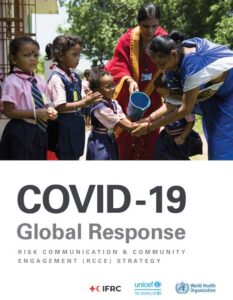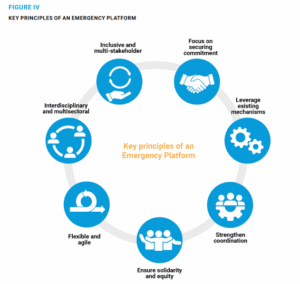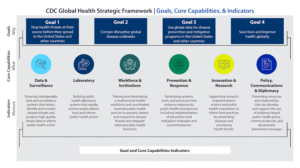Back to: MICROBIOLOGY 300 LEVEL
Welcome to class!
Hello there, superstar! I’m truly glad to have you in class today. You’re becoming more equipped every day to tackle real-world health challenges that affect not just Nigeria, but the entire world. Today’s topic is Global Response Strategies—how the world comes together to fight diseases and health emergencies. It’s like learning how a whole football team—countries, scientists, doctors, and leaders—works together to defend humanity from invisible threats.
Global Response Strategies
Imagine a fire starts in one house on your street. If nobody responds quickly, it could spread and burn the entire neighbourhood. That’s exactly how infectious diseases work—what starts in one country can quickly reach others. This is why global response strategies are important. Countries and international organisations work hand-in-hand to prepare for, respond to, and recover from disease outbreaks, pandemics, and other public health emergencies.

We saw it with COVID-19, Ebola, and even HIV. No country can fight these diseases alone—it takes a united global effort.
Key Global Response Strategies
1. International Health Regulations (IHR 2005)
A legal agreement between 196 countries, coordinated by the World Health Organization (WHO).
Countries must report public health threats within 24 hours.
Helps prevent international spread of diseases by setting rules on travel, trade, and disease reporting.
Encourages transparency and quick response—like when Nigeria reported its first COVID-19 case in 2020.
2. Global Outbreak Alert and Response Network (GOARN)
Managed by WHO, this network brings together health experts from different countries.
They can quickly move to outbreak zones, like during the Ebola outbreak in West Africa.
Think of it like an emergency task force of the best scientists and doctors from all over the world.
3. COVAX Initiative
Launched during the COVID-19 pandemic to ensure fair vaccine access, especially for low- and middle-income countries.

Nigeria received millions of doses through this effort.
Supported by WHO, GAVI, and CEPI.
4. Africa CDC and Regional Collaboration
Africa’s own Centre for Disease Control supports countries across the continent.
It strengthens testing, response, and research capacity across African nations.
They work with NCDC and other national bodies to coordinate regional health action.
5. One Health Approach
A strategy that recognises that human health, animal health, and the environment are all connected.
For example, preventing zoonotic diseases like Ebola or avian flu requires monitoring animals, not just people.
Nigeria uses this approach in collaboration with vet and environmental experts.
6. Research and Development (R&D) Blueprint
Led by WHO, it identifies priority diseases needing urgent research (e.g., COVID-19, Zika, Marburg virus).
Encourages collaboration on vaccines, diagnostics, and treatments—so countries don’t duplicate efforts.
7. Emergency Medical Teams (EMTs)
Rapid response teams sent by countries to assist others in crisis.
Nigeria sent health workers to Sierra Leone during Ebola; similarly, other countries helped Nigeria during COVID-19.

Let’s say there’s a new flu virus outbreak in Asia. Under IHR, the country must alert WHO. Scientists worldwide begin working on tests and vaccines. COVAX ensures poorer countries like Nigeria don’t get left behind. Africa CDC coordinates with NCDC. Global experts from GOARN arrive to help. All of this happens so the outbreak doesn’t spread and cause massive harm. That’s global response in action!
Summary
- Global response strategies involve international rules, collaborations, and rapid support during health emergencies.
- Key bodies include WHO, GOARN, Africa CDC, and COVAX.
- Strategies focus on fairness, speed, science, and partnerships.
- Nigeria benefits from and contributes to these efforts through NCDC and international cooperation.
Evaluation
- What is the main purpose of the International Health Regulations (IHR)?
- How does the COVAX initiative support low-income countries?
- What is the One Health approach and why is it important?
- Name one role of the Africa CDC.
- What does GOARN stand for and what does it do?
You’ve just learned how the world comes together to protect lives during disease threats—and you’re becoming part of that solution. Your knowledge matters. Your effort matters. Keep going! Afrilearn is proud to walk this path with you as you grow into a future health hero. See you at the next lesson, champ!
